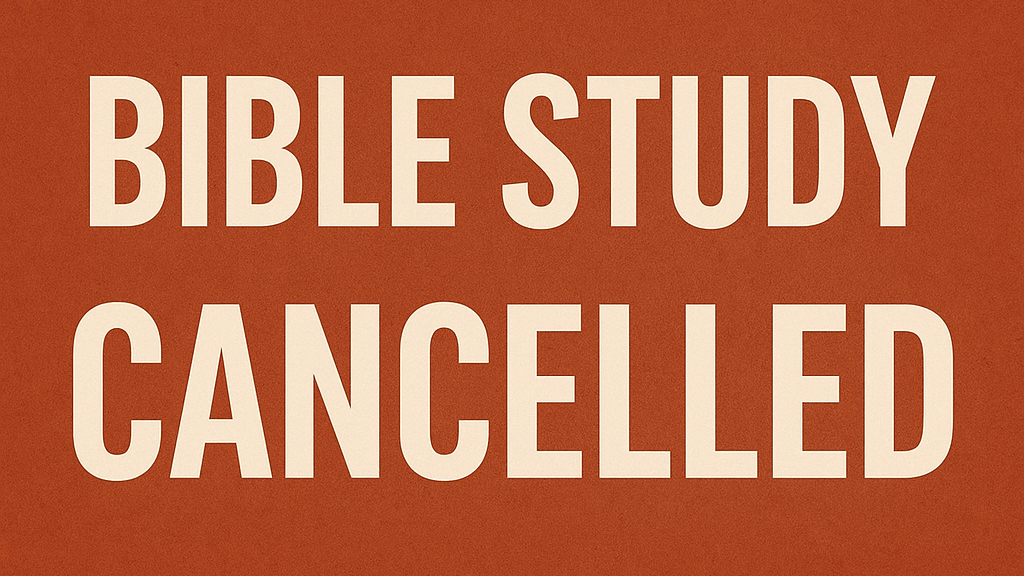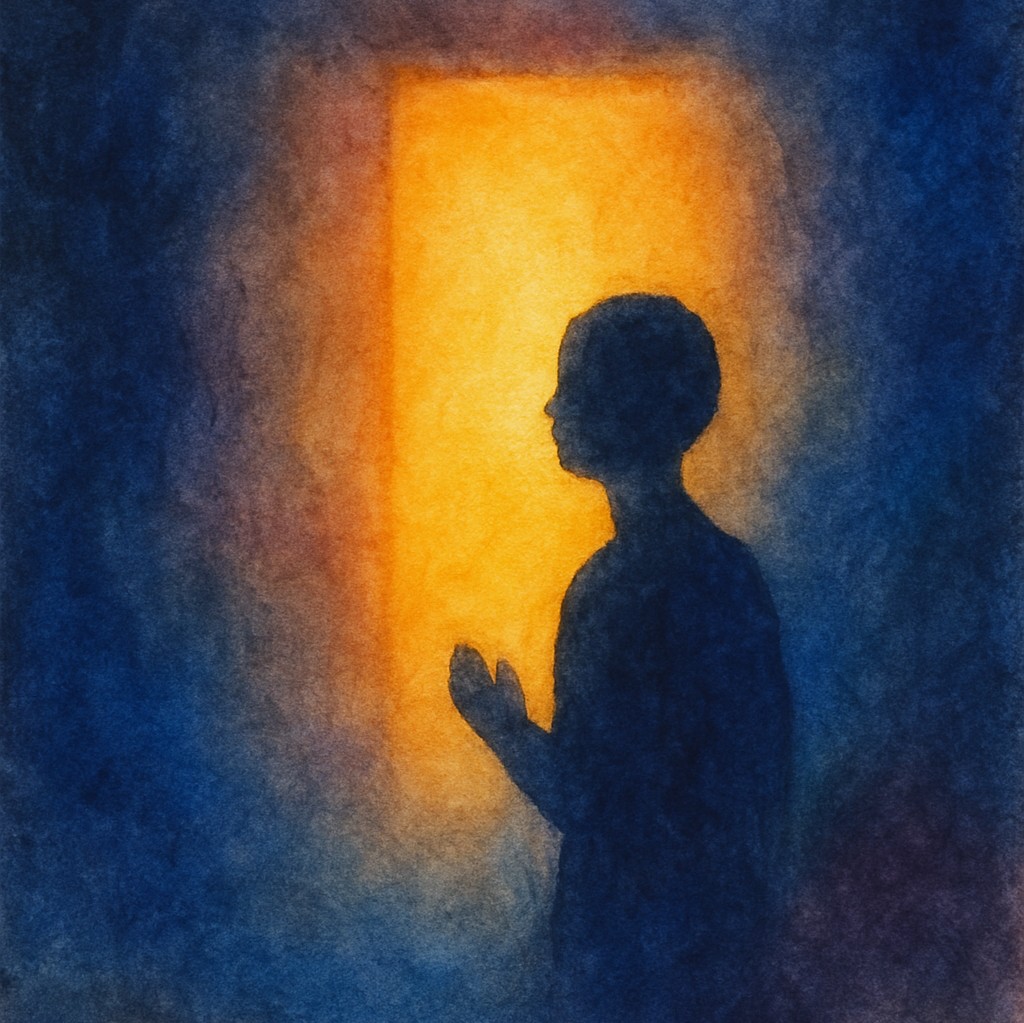What's Happening?
Bible Study Cancelled Today
Tuesday, October 14th, 2025
Today’s Bible Study has been cancelled so that we may come together as a community to honour and remember Joan Thomas.
Her memorial service will be held today (Tuesday, October 14th) at 1:00 p.m. at York Funeral Home.
We invite everyone to join in support of Joan’s family and in gratitude for the many ways her life touched ours.

Sacred Rhythms: Seeing with God’s Eyes
1 Samuel 16:1–13
When Samuel went to anoint the next king of Israel, he was sure he knew what to look for. Strong shoulders. A confident presence. The kind of person who looked like a leader. But as each of Jesse’s sons passed by, God’s quiet voice whispered, “Not this one.”
And then came David: young, overlooked, still smelling of the fields. It’s then that God reminds Samuel, “The Lord does not see as mortals see; they look on the outward appearance, but the Lord looks on the heart.”
How often do we get caught in that same trap, judging by appearances, first impressions, or our own assumptions? But this story invites us into a different rhythm: a way of seeing with God’s eyes.
To see with God’s eyes is to slow down. It’s to pause long enough to look beneath the surface, not just of others, but also of ourselves.
God sees potential where we see limitation.
God sees courage where we see fear.
God sees beauty where we might see brokenness.
This practice isn’t easy; it requires patience, humility, and compassion. But each time we look with God’s eyes – when we see the heart rather than the exterior – we participate in God’s healing vision for the world.
Each day this week, try this simple practice of holy seeing:
- Pause: Take a few slow breaths and ask, “God, help me see as You see.”
- Notice: As you interact with others (or even think of someone from afar), notice your first impressions. Then, gently ask yourself, “What might God see here that I’ve overlooked?”
- Reflect: At day’s end, write or pray about one moment when your perspective shifted, even slightly.
You might find that God opens your heart to a person, a situation, or even a part of yourself that you hadn’t truly seen before.
Let’s pray:
God who sees beyond appearances, teach me to look with compassion. To be curious instead of judgmental. Where I see difference, help me to see Your image. Where I see weakness, help me to see Your strength at work. Where I see nothing but the surface, open my heart to the depth of Your love. Let me see, even for a moment, as You see. AMEN

Mid-Week Moment: The Courage to Speak Hard Truths
1 Samuel 3:1–21
Samuel’s call story is beautiful, but it isn’t easy. The boy hears God calling in the night, not once but three times, until Eli helps him recognize the voice that speaks. And when Samuel finally listens, the word he receives is not one of comfort but of judgment: Eli’s house will fall because of his sons’ corruption and his failure to restrain them.
The next morning, Samuel is afraid. Who wouldn’t be? How do you tell the very person who raised you, the mentor who guided you, that God has spoken words of condemnation against them? Yet Samuel, encouraged by Eli, finds the courage to speak the truth.
This moment reminds us that listening to God is only half the journey. The other half is responding faithfully, even when it’s uncomfortable. Sometimes God’s word unsettles us. Sometimes faithfulness calls us to name what is wrong, to stand against injustice, or to speak a hard truth in love.
Courage doesn’t mean we are unafraid. It means we are willing to trust God enough to step forward anyway. Samuel’s story shows us that when God calls, God also gives the strength to respond.
Take some time this week to reflect on the reading and the following questions.
- Have you ever felt God nudging you to say something that was difficult to speak? How did you respond?
- Where do you see the need for truth-telling in our world, our community, or even your own relationships?
- How can you cultivate the courage to speak truth with love, trusting God’s presence to go with you?
As you wrestle with the truths God calls you to speak and the justice God calls us to live, carry this prayer with you:
God who calls us by name, give us ears to hear your voice and hearts ready to respond. When your word unsettles us, grant us courage to listen and to speak with love. Help us to trust that you are with us, strengthening us for every faithful step. Amen.

Sacred Rhythms: Responding “Here I Am”
1 Samuel 3:1–21
In the quiet of the night, Samuel heard a voice calling his name. At first, he thought it was Eli. Only after patient guidance did Samuel realize it was the voice of God. His simple response, “Here I am,” opened the door to a lifelong calling.
Samuel’s story reminds us that God’s call often comes quietly, in ordinary moments, and that the most powerful response isn’t complicated. It’s simply a willingness to be present. “Here I am” is not a declaration of perfection or certainty. It’s a prayer of openness: I am listening, God. I am ready to follow.
This week’s practice invites us to take up Samuel’s prayer as our own.
- Begin Each Morning – When you wake up, before checking your phone or rushing into the day, pause and pray: “Here I am, Lord. Speak, for your servant is listening.”
- Carry It With You – Throughout the day, whenever you face a decision, interruption, or opportunity, silently repeat: “Here I am.” Let it center you in openness.
- Evening Reflection – At the end of the day, ask: Where did I sense God’s call today? How did I respond? Journal a short note or simply hold it in prayer.
Take this prayer with you into the week
God who calls, teach us to listen in the quiet and to recognize your voice in the everyday. Give us hearts ready to answer, “Here I am.” And let our simple yes become the beginning of your work in us. Amen.

Mid-Week Moment: Daily Bread, Daily Trust
Exodus 16:1–18
The wilderness was not easy. The Israelites were hungry, uncertain, and afraid. Their memories of Egypt – even with all its pain – started to look better than the unknown future they faced. And so they grumbled.
God’s response was not anger, but provision. Each morning, manna appeared with the dew, just enough for the day. Those who gathered much and those who gathered little found that everyone had exactly what they needed. When some tried to hoard more than their share, it spoiled.
It’s a powerful picture of God’s abundance: not an endless stockpile, but enough for each day. Abundance in God’s kingdom is not measured in excess, but in sufficiency. The challenge was not simply to gather the bread, but to learn to trust that tomorrow, it would be there again.
We live in a world that prizes accumulation and self-sufficiency. But this story invites us to another way: to receive today as gift, to trust God for tomorrow, and to live with open hands. That is where we begin to experience abundance.
I invite you to read through the passage a few times this week, and reflect with the following questions:
- Where do you find yourself longing to “store up” more than you need out of fear or uncertainty?
- How might practicing daily gratitude help you trust in God’s provision one day at a time?
- What does it look like to live with open hands, ready to receive today’s bread and share with others who need it?
As we reflect, let’s pray:
God of daily bread, you meet us in our hunger and our worry. Teach us to trust in your provision, to find sufficiency in each day, and to let go of the fear that drives us to hoard. Open our hands to receive your gifts and to share them freely, so that all may know your abundance. AMEN

Sacred Rhythms: From Scarcity to Gratitude
Exodus 16:1–18
When the Israelites found themselves in the wilderness, their first instinct was to look back. “If only we had died by the hand of the Lord in Egypt. At least there we sat by the fleshpots and ate our fill of bread.” Scarcity spoke louder than memory, louder than hope.
But in the midst of their fear, God gave them manna: bread from heaven, new every morning. There was enough for everyone. Not too much, not too little. Just enough.
Scarcity thinking is deeply ingrained in us. We worry that we don’t have enough time, enough energy, enough money, enough skill. Yet God’s abundance is woven into our days in ways we often overlook. Gratitude is the practice that helps us notice.
This week, practice gratitude as a way of embracing God’s abundance.
- Evening Pause: Before bed, take a few minutes to reflect on your day.
- Name Three Moments: Write down three places where you experienced abundance. It could be a conversation, a meal, a glimpse of beauty, or simply breath in your lungs.
- Offer Thanks: Whisper a prayer of gratitude for each one.
At the end of the week, look back over your list. You may be surprised at how God’s provision has been quietly present all along.
Carry this prayer with you as you take note of God’s abundance in your lives.
Generous God, you feed us with more than bread. Open our eyes to the abundance all around us. Turn our grumbling into gratitude, and our fear into trust. Give us hearts that rest in your provision, day by day, moment by moment. AMEN

Mid-Week Moment: Unexpected Holy Ground
Exodus 2:23–25; 3:1–15; 4:10–17
Moses wasn’t in a temple or a sanctuary when God called to him. He wasn’t at a festival or feast day, surrounded by prayers and hymns. He was out in the wilderness, tending sheep. Ordinary work. Ordinary ground.
But then, in the middle of his everyday routine, something caught his attention: a bush, burning but not consumed. He turned aside, and in that moment he found himself standing on holy ground.
It’s easy to imagine that God’s presence belongs in special places: churches, cathedrals, retreats, pilgrimages. Yet this story reminds us that God’s holiness can break into the most ordinary spaces. The desert path, the workplace, the home kitchen, the hospital hallway, the classroom desk, these too can become holy ground when we pause long enough to notice.
In last week’s reading, Jacob said, “Surely the Lord is in this place, and I did not know it.” Moses might have said the same. And perhaps we can too. The invitation is not just to look for God in the obvious places, but to open our eyes to the possibility that any place can become a place of encounter.
Holiness doesn’t always look like the spectacular. Sometimes it’s the simple surprise that draws us to pay attention, to take off our “shoes,” and to recognize: God is here.
Take time with this reading and with your day and reflect on these questions:
- Where in your daily routine might God be inviting you to “turn aside” and notice holy ground?
- Have you ever experienced God’s presence in a place you never expected?
- What would it look like to pause and honor the ordinary spaces in your life as places where God meets you?
Let’s pray:
God of burning bushes and holy ground, open our eyes to see you in the ordinary places of our lives. Help us to turn aside from our busy routines and recognize your presence that surrounds us. May we learn to walk gently, with hearts ready to notice that we stand on holy ground wherever you are with us. AMEN

Sacred Rhythms: Listening Prayer
Exodus 2:23–25; 3:1–15; 4:10–17
The story of Moses begins with a God who listens. The Israelites groaned under the weight of their suffering, and the text says, “God heard their cry … God knew their pain.” Before the burning bush, before the call to lead, there is this truth: God is the One who hears.
This is good news. Our prayers, our sighs, even our wordless groans are gathered up by a God who listens with compassion. But it’s also a calling. If we are to follow this God, then we are invited to become people who listen, attentive not only to our own needs, but also to the cries of others and the world around us.
This week’s practice is a way of leaning into that rhythm of listening.
- Begin with Silence. Find a quiet place. Sit comfortably. Take a few deep breaths and ask: “God, help me hear what you hear.”
- Listen Within. Pay attention to your own soul. What aches, worries, or longings are you carrying? Offer them silently to God.
- Listen Beyond. Ask God to bring to mind someone else’s cry. It may be a person you know, a story in the news, or even a place in the world that suffers. Hold them in prayer.
- Close with Trust. End by praying: “God of compassion, thank you for hearing. Help me to be attentive and responsive to the cries around me.”
Why This Matters
When we practice listening prayer, we join in God’s work of compassion. We don’t need to have all the answers or solve every problem. Instead, we become people who notice, who carry the cries of others before God, and who stay open to being part of God’s response.

Mid-Week Moment: Blessing in the Midst of Mess
Genesis 27:1–4, 15–23; 28:10–17
The story of Jacob and Esau is messy. Jacob tricks his blind father into giving him the blessing meant for his brother. Rebekah plots behind the scenes. Esau is left betrayed and angry. This is a family torn apart by favoritism, deception, and broken trust.
And yet, as Jacob flees the fallout of his choices, he finds himself met by God in the wilderness. With nothing but a stone for a pillow, Jacob dreams of a ladder stretching between heaven and earth. When he wakes, he realizes: “Surely the Lord is in this place, and I did not know it.”
It’s striking that God doesn’t wait until Jacob has his life together. God doesn’t withhold presence until Jacob proves himself worthy. Instead, God shows up right in the mess – right in Jacob’s flight, fear, and failure – and offers the blessing of presence: “Know that I am with you and will keep you wherever you go.”
That is good news for us, too. God’s blessing is not reserved for those who have perfect families, spotless histories, or flawless faith. God meets us in our wilderness places, even when they are shaped by our own mistakes. The blessing is not earned. It is given, because that is who God is.
Here’s some questions to reflect on as you look through the reading and think back on the bumpy roads and blessings of your life:
- Where in your life do you feel caught in the “mess”: family tensions, personal regrets, or complicated relationships?
- How have you experienced God showing up for you in ways you didn’t deserve or expect?
- What might it mean for you to trust God’s promise: “I am with you and will keep you wherever you go”?
Let’s pray as we continue through the week:
God of Jacob and Esau, you meet us in the tangle of our lives, where failures weigh heavy and relationships fray. Thank you for blessing us not because we are perfect, but because you are faithful. Help us to notice your presence even in the wilderness places, and to trust your promise to stay with us, wherever we go. AMEN

Sacred Rhythms: Sacred Space
Genesis 27:1–4, 15–23; 28:10–17
Jacob’s story is tangled with family conflict, deceit, and longing for blessing. Yet it is in the middle of his fleeing – tired, alone, with only a stone for a pillow – that Jacob has his dream of the ladder, the angels, and the voice of God. He wakes up stunned:
“Surely the Lord is in this place, and I did not know it.”
So often, we think of “holy places” as sanctuaries, chapels, or pilgrimage sites. But Jacob reminds us that any place – a lonely wilderness, a restless night, a kitchen table, or a bus stop – can become a meeting place with God.
This week’s practice is about becoming aware of sacred space wherever you are. Try to follow these steps to become aware of the sacred spaces all around you.
- Pause three times a day (morning, noon, evening works well). Wherever you are, stop for a moment.
- Breathe deeply three times, letting yourself become present.
- Look around you. Notice where you are—the room, the people, the sounds, even the silence.
- Pray Jacob’s words: “Surely the Lord is in this place.”
- Carry that awareness with you into what comes next.
Over time, this rhythm helps us see that there is no divide between “ordinary” and “holy.” God is here—always here—waiting for us to notice.

46 Main Street
Fredericton, New Brunswick
E3A 1C1
506-458-9452 (Church Office)
506-262-2150 (Rev. Richard's Cell)
Office Hours
Tuesday - Friday 9am to 2pm
Rev. Richard's Drop-in Office Hours
Tuesday & Thursday 10:00AM to 12:30 PM
We dedicate the revitalization of our online presence to the memory of the late Mary Hicks. We are grateful for Mary’s personal estate bequest in support of the work and mission of Nashwaaksis United Church.
